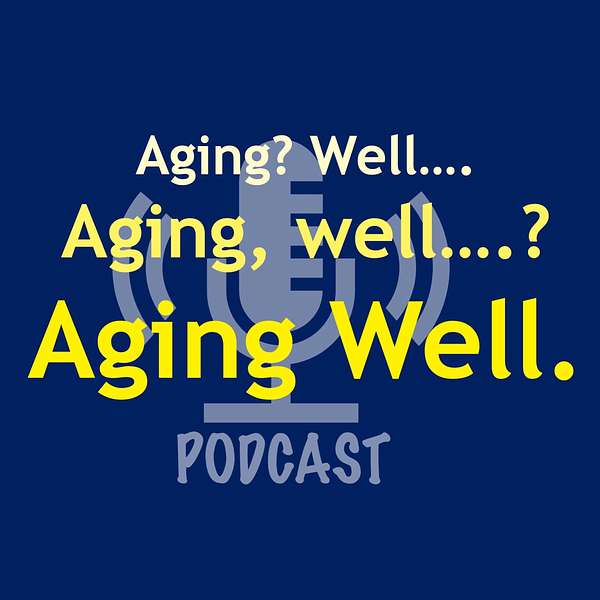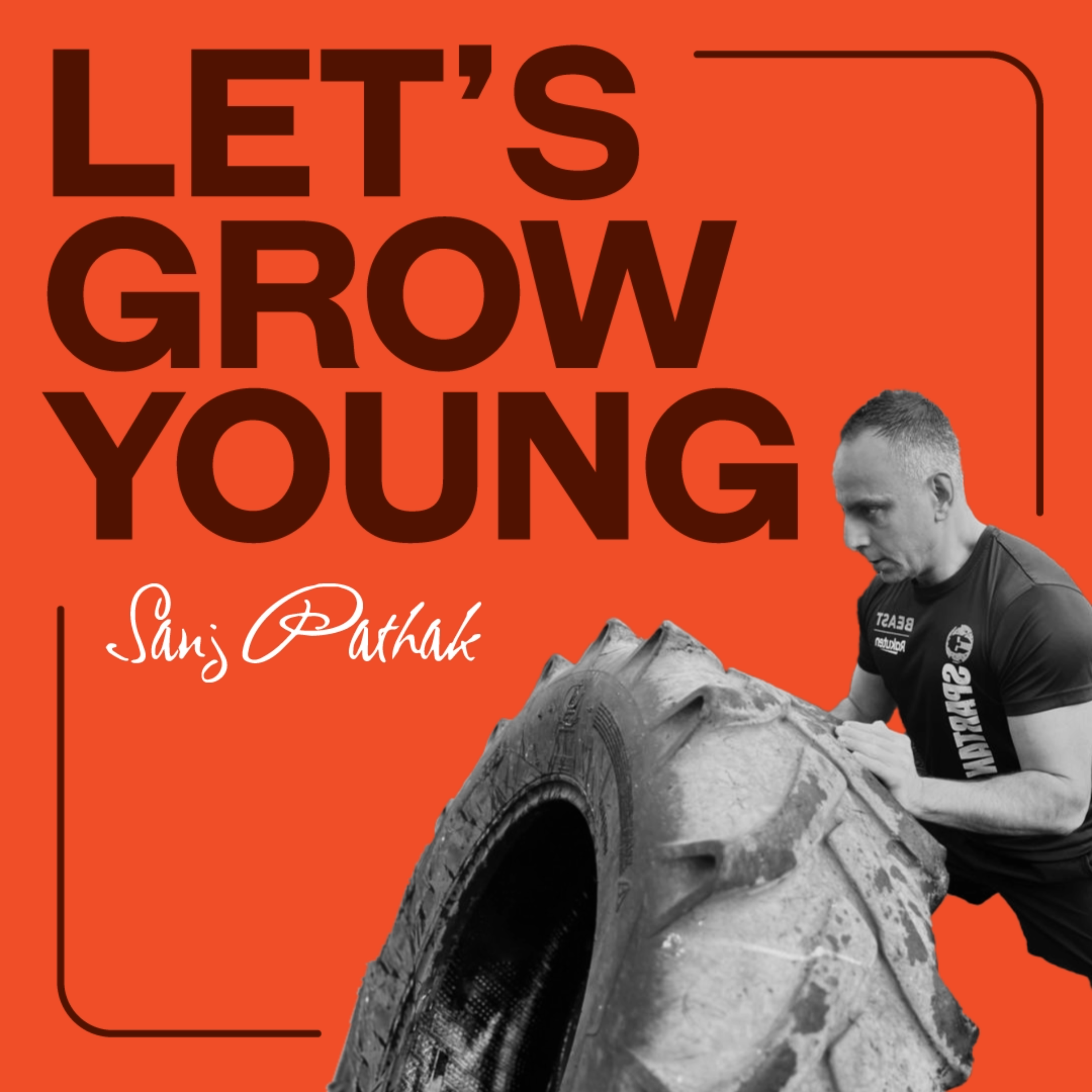
Aging Well Podcast
The "Aging Well Podcast" is about, well...aging. It's for people of all ages who are interested in aging successfully. The topics include the Spiritual, Physical, Intellectual, Emotional, and Social dimensions of wellness as they relate to living as well and as long as possible, as well as the financial, legal, and housing questions that everyone has about aging well. Do you have a question you want answered or topic you want discussed on the "Aging Well Podcast"? Send us an email to agingwell.podcast@gmail.com or record your question for us to use in an upcoming episode at following link: Record a message
Aging Well Podcast
Episode 205: Old Age or NOT Aging Well?
In this micro-pod episode of the Aging Well Podcast, Dr. Jeff Armstrong and Corbin Bruton discuss the challenges healthcare providers face when communicating with older adults about age-related health conditions. Highlighting Dr. Fabrizia Faustinella's MedPage Today article, they explore the emotional reactions patients have towards acknowledging aging and the negative societal connotations attached to it. The discussion differentiates the effects of biological aging from inactivity, emphasizing the importance of honest yet compassionate communication. The podcast also addresses strategies for empathetically engaging with older adults, the impact of ageism in healthcare, and how lifestyle choices affect the aging process. Tune in for insights on maintaining dignity and understanding in age-related health conversations.
Get a 12% discount using promo code (AGEWELL) and track your pace of aging well.
Disclaimer: This post contains affiliate links. If you make a purchase, I may receive a commission at no extra cost to you.
Have questions you want answered and topics you want discussed on the Aging Well Podcast? Send us an email at agingwell.podcast@gmail.com or record your question for us to use in an upcoming episode:
https://www.speakpipe.com/AgingWellPodcast
Welcome to the Aging Well Podcast. I'm Dr. Jeff Armstrong here with Corbyn Bruton. In this thought provoking episode, we discuss how healthcare providers communicate with older adults about their age related health conditions, and why this can sometimes be so challenging. We discuss the role of biological age versus chronological age in the discussion of aging well.
Jeff:In this episode I'd like to open with an article written by Dr. Fabrizia Faustinella, an internist from Baylor College of Medicine, who wrote in MedPage Today about her experiences with patients who find it difficult to accept some of their health issues are related to aging. Let's start by setting the scene. Imagine being a healthcare provider and having a patient, let's call her Karen, who's 85 years old. And has been experiencing knee pain. you explain to Karen that the pain is due to degenerative joint disease, which is common later in life. But Karen is not satisfied with the explanation. She doesn't want her pain to be just because of old age.
corbin-bruton_2_11-02-2024_085912:Dr. Faustinella describes situations like this as surprisingly common. Patients often seem to reject the idea that physical decline is a natural part of aging. Some of them feel insulted when you tell them, their condition is due to aging.
jeff_2_11-02-2024_085912:Exactly. And Dr. Fastanella even mentions a colleague who felt that he couldn't tell his patients the truth anymore because they. Take it as an insult. So now I want to differentiate between the effects of aging and the effects of inactivity on aging, but First, let's discuss the article itself.
corbin-bruton_2_11-02-2024_085912:Dr. Armstrong, why do you think there's such a strong emotional reaction with health issues for people that are aging?
jeff_2_11-02-2024_085912:Well, I think it's multifaceted. part of it is denial. People don't want to feel like they're old because society has so many negative connotations attached to aging. another part might be how our culture reveres youth and often disregards the elderly. I mean, you go on YouTube and social media even in the longevity circles, it's all about youth, youth, youth, looking young and that perception of young. when we talk about growing old, it's like, it's such a bad thing, to be old and that age is something to be punished rather than rewarded in our society. we need more Celebration of people getting old. We need, you know, it was such such a disappointment and Betty White passed away at 99 instead of 100. that was one of the rare situations where celebrities in our society were elevated because of their age. And part of it is because, you know, she looks so great and everything else. And it's like, you know, you get the comments. Oh, she's so healthy and looks so great for her age. And that for her age thing is something that Dr. Fastanella kind of brings up, and she brings up an important point about ageism. She says that our society is somewhat hostile toward older adults. There's a stigma against aging, and that's what makes these conversations harder.
corbin-bruton_2_11-02-2024_085912:She even brings up controversies over President Biden's age and how much of the criticisms could be rooted in ageism. We see this a lot here on the Aging Well podcast, where older people are sometimes dismissed or not taken seriously.
jeff_2_11-02-2024_085912:And this goes back to the term ageism, which was coined in 1969 by Dr. Robert Neil Butler. It refers to discrimination against seniors, which We see everywhere in our society from workplaces to healthcare settings.
corbin-bruton_2_11-02-2024_085912:Yeah, and this discrimination has real consequences, as Dr. Fostinelli points out. Long lives, thanks to medical advancements, are they fulfilling lives if society continues to harbor these negative attributes?
jeff_2_11-02-2024_085912:Well, that brings us to a question. How can healthcare providers help patients navigate the aging process without feeding these negative. Stereotypes. Dr. Fastanella emphasizes the importance of honest yet compassionate communication.
corbin-bruton_2_11-02-2024_085912:she talks about how some patients would rather be diagnosed with a specific disease that accepts that they are simply getting older. They feel that a disease provides a more socially acceptable reason for their decline. So, it's kind of like a psychological thing, really.
jeff_2_11-02-2024_085912:Yeah, and that's where things get tricky. If healthcare professionals give in to this pressure and start attributing everything to disease rather than aging, It might lead to unnecessary treatments, anxiety, and even lower quality of life for the patient.
corbin-bruton_2_11-02-2024_085912:Now you mentioned the role of inactivity. This really calls to question the interplay between lifestyle, genetics, and disease.
jeff_2_11-02-2024_085912:Yeah, so we talk about that a lot on this podcast, is that it's a lifestyle thing. it's biomechanical, psychosocial. And we talk about epigenetics and we talk about how we have a bit more of a role and a purpose in kind of living a lifestyle that is going to allow for us to be healthy, you know, as I would tell my students, you know, to not take advantage of the commons and that becomes hard, you know, when we start telling people. the lifestyle choices they make are responsible for the outcomes in their life. we're a nation of, independence and personal freedoms, and we have that right to do what we want to do. And so that's, I think, we're kind of, as we get into health care, you know, one of the key takeaways is to find a balance, medical professionals need to recognize the reality of aging. While also supporting patients through the challenges it brings. as Dr. Fastanella says, physicians should be the patient's best advocates. So let's talk about some of the strategies for communicating with older adults about these sensitive topics. And how do we balance. Being truthful with being compassionate.
corbin-bruton_2_11-02-2024_085912:One strategy could be using empathetic listening, making sure that the patient feels heard and understood before jumping into any conclusions about their condition. That's
jeff_2_11-02-2024_085912:Yeah. another strategy is to reframe the conversation instead of saying this is just because you're getting older. We could focus on how lifestyle changes can help manage symptoms or improve the quality of life.
corbin-bruton_2_11-02-2024_085912:a great point. empowering the patient rather than making them feel like they're losing control.
jeff_2_11-02-2024_085912:And again, it's really about responsibility and education. we need to get people taking responsibility for the choices that they make, but we also have to educate them What are the right choices? And how do we go about actually doing the right thing? it's clear that discussing age related health questions is very complex. we talked in a recent episode about the make America healthy again, movement, and how society needs to manage its part in terms of making. Health accessible, not just health care, but making health an accessible right for everyone. with the right approach, I think that health care professionals can support patients in navigating the aging process with dignity and understanding,
corbin-bruton_2_11-02-2024_085912:And for our listeners aging is a natural part of life and how we handle it makes all the difference. Thanks for tuning in and be sure to subscribe to the Aging Well podcast. And if you have any questions or topics that you'd like us to discuss, please message us. a link will be provided in the description section. Until next time, keep aging well.
Thank you for listening. I hope you benefited from today's podcast. Until next time, keep aging well.







